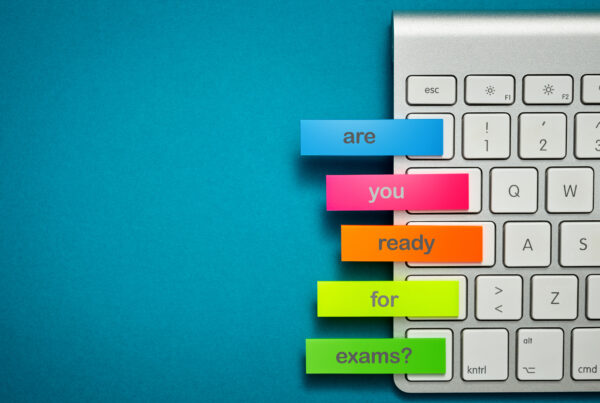For the neurotypical student, choosing between the ACT and SAT is often moot. However, when choosing between the ACT and the SAT for students with a learning disability, these tests can be drastically different. While both tests offer similar accommodations, there are fundamental differences within the tests that can force a clear winner depending on your disability and approved accommodations. In short, if your student has a language-based learning disability, the ACT is probably the best fit. If your student has ADHD, they may prefer the new 2024 digital SAT. You can see our full blog post on the ladder suggestion here. Regardless of disability and accommodations status we always suggest students start by taking our practice test program to expose them to the different tests and their formats.
Fundamental Differences between the ACT and the SAT
SAT
While the SAT format and structure are changing with the release of the digital SAT in 2024, the SAT is still a highly language-oriented test. Understanding what the question is asking is a fundamental part of the test, and therefore the questions are written to be confusing. The SAT does not particularly test speed; it provides a considerable amount of time to complete each question. Instead, the most difficult part of the SAT is often understanding what the questions themselves are asking. The new 2024 SAT no longer tests Reading skills in the Math section and allows for a calculator for the entire test. 50% of your total score is from the Math section.
ACT
The ACT is fundamentally a problem-solving test. While incredibly fast in its pacing, the ACT is a literal and straightforward test. The ACT does not attempt to trick you in their wording of questions; they are more interested in your ability to solve the problem than your ability to interpret the question. The ACT includes a “Science” section, which is really a secondary Reading section using charts and graphs. Students are not expected to be familiar with the scientific content discussed in these passages. Only 25% of your total score is from the Math section.
Is the ACT or the SAT better?
Determining the better fit between the ACT and the SAT depends on your student’s specific disability and accommodations. As a student, you do not want to be fighting against a test that was written to expose your greatest weaknesses and hide your strengths. This does not hold true for all learning disabilities, but our general recommendation for second language learners, students with dyslexia, and auditory processing disorders is to take the ACT. We have a comprehensive blog post here going through why the digital SAT may be a better fit for students with ADHD. With considerable practice and prep students of all abilities can improve both their SAT and ACT scores.
Why the ACT Is Often Better
While the ACT for students with learning disabilities can be very difficult to finish in the amount of time given, and generally difficult to finish even if students do not have a learning disability, if a student is receiving extra time the test can become considerably easier. When given extra time on the ACT, you are essentially removing one of the major difficulties of this test. With the SAT, a student with slower reading speeds will benefit from extra time; however, extra time will not significantly help a student who continues to struggle with the general wording of the questions. For students with certain learning challenges, no amount of extra time will help a student decode the language on an SAT question.
Types of Accommodations Available on the ACT/SAT
Taking the ACT and/or the SAT can be a very challenging part of the college admissions process. If your student has a learning disability, psychological disorder, or physical disability, you should consider applying for accommodations as soon as possible.
These accommodations can be paramount to a student’s success on the test. The ACT and SAT were and are not written with the neurodivergent individual in mind. Therefore, the scores of anyone with language impairments or learning disabilities are often disproportionately negatively affected on these exams.
Accommodations can make all the difference to a student’s testing experience and score. Contact your student’s school early to start this process, as accommodations can take months to be approved by the testing agency. For help on how to apply for accommodations please see our blog post for the SAT and the ACT.
Please note that no college or admissions officer can see that your student took the test with accommodations, and students should be encouraged to use the full extent of their accommodations. See the list of commonly requested accommodations below:
1. Extended Time
The most common accommodation on these exams is for 50% (ACT) or one-half (SAT) extended time. However, students can also apply for double or even triple time on the exam.
2. Multi-day Testing
Taking the exam over a multi-day period where students do not need to focus for as long can be very helpful. On the ACT, this accommodation can be applied in addition to 50% time or is given automatically when a student is approved for 100% extra time. On the SAT, this accommodation is applied through “limited-time testing” which allows students regardless of extra time accommodations to apply to take the test over multiple days.
3. Computer Use
Starting in 2024, the primary SAT will be digital, meaning that it is proctored and completed entirely on a computer. However, students can apply to take a paper-based version of the test instead. You can read more about how this will affect students with learning differences here. On the ACT, you can only request accommodations for the use of a computer in the Writing section of the exam. In general, Mindfish does not recommend students take the Writing section of the test since very few schools require it.
4. Extra and Extended Break
Accommodations for Extra or Extended Breaks on the ACT can be used with or without extra time accommodations. Students typically request either extended breaks between sections or unlimited breaks.
5. Reading and Writing
There are a variety of accommodations for students who need support interacting with the exams. Their accommodations vary depending on the nature of a student’s disability. For paper tests, students can apply for large Print/Braille test booklets, translation dictionaries, audio recordings, a human reader, a scribe, or bubbling assistance. For the digital SAT, students can access similar accommodations through the Zoom feature, or other assistive technology like text-to-speech software. You can read more about how accommodations differ on the digital test here.
6. Separate Testing
Both the ACT and the SAT offer students the opportunity to apply for a private room, small group testing, preferential seating, or an alternative testing site.
Neurodivergent/Learning Disability Specific Test Prep
If you want your students to work with someone specifically trained to work with students with learning differences please see our options for Neurodivergent Test Prep Tutoring.
Questions?
If you have any questions if your student should take the SAT or the ACT please reach out to our learning disability and accommodations expert Hailey Andler at hailey@mindfish.com or 720-307-2750.
Interested in learning more about Test Prep at Mindfish?
Contact us today to find out what our dedicated tutors can help you achieve.





